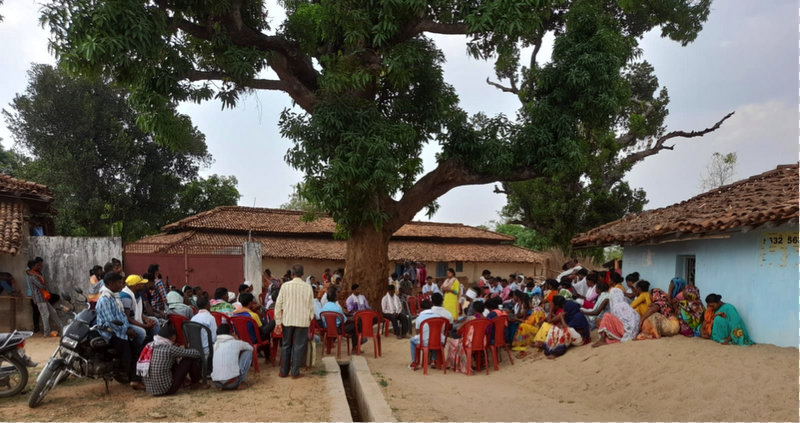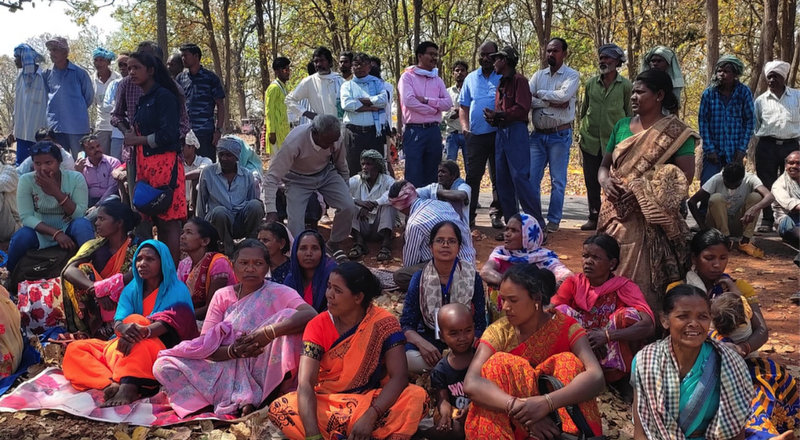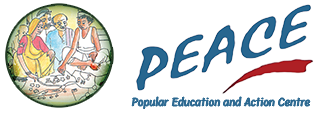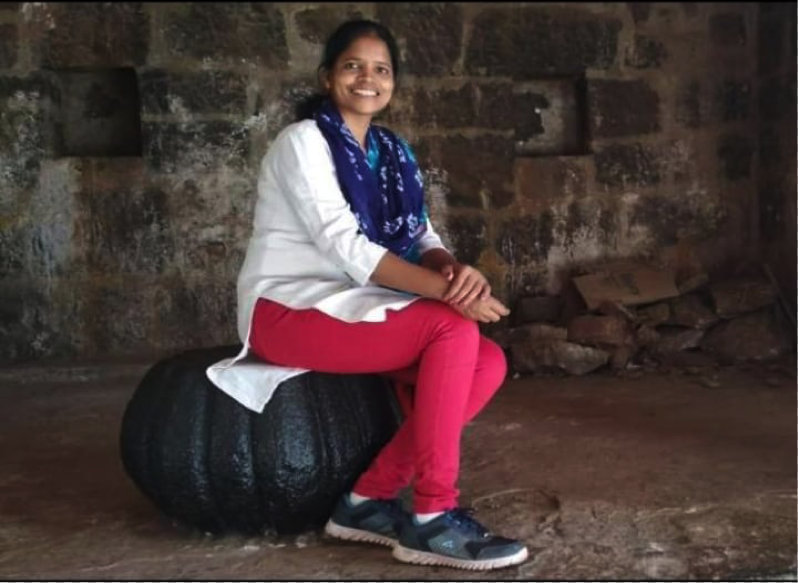Name of Fellow: Joyti Lakra
Genre: Art and Culture
Area of Work: Gadva, Jharkhand
Joyti Lakra is a senior cultural activist from Jharkhand and has been involved in struggles against witch-hunting of women, women rights and education of girls.Joyti comes from Kurukh tribe from Jharkhand’s Gadva district. Her family was displaced due to the construction Kutku dam on East Koyal River. Her family was dependent of agriculture on community land as the village was a forest village. Following their displacement, her family shifted to Borkol village. Due the loss of their agricultural land, her brothers were forced to migrate to cities in search of work. Her brothers are still working as labourers in Delhi, Chhatisgarh and Odisha.Without much livelihood left in the village, Joyti moved to Dalton Ganj to pursue her studies. After completing her graduation in 1999 from there, she got married and moved to Ranchi. Inspired her husband Sunil, who was an activist, Joyti started writing and she left the need to pursue her master’s degree. She joined Ranchi University to study Kurukh language as she wanted to write in her own language.Her association with Sunil influenced her largely towards social work and as she herself was displaced and witnessed the after effects of it, Joyti started to participate in movement herself.In the process, she started her career as a social worker with Action Aid and have been part of various movements in Jharkhand. She led campaigns on mental health issues, researched on implementation of the Panchayat Extension to Scheduled Areas Act (PESA), Right to Education Act (RTE) among others. She also worked to create community journalists from Adivasi women by giving them training on video story telling.She became close to social issues due her personal relations with activists in the state. One area she identified was the discrimination and alienation of women in Jharkhand by declaring them witches. When a woman is declared a witch, it is easier for the people to execute her summarily and with impunity. So, she decided to create awareness among the tribal women about such superstations and how women were victimized through this practice.Joyti noticed that in folk songs, many references are made to women and compared to witches. This prompted her to pursue her research on the folk song prevalent among Adivasi and other indigenous groups in the state.During her professional affiliations with various non-government organisations, she had travelled many districts of Jharkhand and thus she had the knowledge of various practices in Adivasi communities. Through knowledge about the communities, she could identify their folk songs and the its content. Analysing the songs, she found that the songs included discriminatory ideas about women.Through her research on folk songs, she has been compiling various songs on social harmony, witch related songs, songs on women, Adivasi environmental songs, songs devoted water bodies etc.

Jyoti lakra has been associated with a cultural group Akhra run by famous cultural artist Meghnad in Jharkhand. Jyoti has a long experience on working on the issues of child trafficking in Jharkhand.Through the fellowship program Jyoti wants to work on issue of dayan pratha (witchcraft) where single or widow women are being targeted in the name of witch hunting. Jyoti wants to create awareness against this mal practice through various forms of art and culture. She wants to document the cases where women have been harassed by this practice which would be subsequently used to develop songs and plays.

Jyoti will also collect folk stories and songs of Ooranv community and bring out the values
hidden in these traditional songs and stories to the community.Collected around 50 folk songs from Kuduk community and has made 3 case studies on witch-hunting case. She is also writing poems on the issue to highlight the plight of single or widowed women.Jyoti has already been using these folk songs for social awareness among women and engage with community. During the fellowship, she plans to spread awareness among women of community-based organisations about constitutional values through songs and other art forms.
 Jyoti lakra has been associated with a cultural group Akhra run by famous cultural artist Meghnad in Jharkhand. Jyoti has a long experience on working on the issues of child trafficking in Jharkhand.Through the fellowship program Jyoti wants to work on issue of dayan pratha (witchcraft) where single or widow women are being targeted in the name of witch hunting. Jyoti wants to create awareness against this mal practice through various forms of art and culture. She wants to document the cases where women have been harassed by this practice which would be subsequently used to develop songs and plays.
Jyoti lakra has been associated with a cultural group Akhra run by famous cultural artist Meghnad in Jharkhand. Jyoti has a long experience on working on the issues of child trafficking in Jharkhand.Through the fellowship program Jyoti wants to work on issue of dayan pratha (witchcraft) where single or widow women are being targeted in the name of witch hunting. Jyoti wants to create awareness against this mal practice through various forms of art and culture. She wants to document the cases where women have been harassed by this practice which would be subsequently used to develop songs and plays. Jyoti will also collect folk stories and songs of Ooranv community and bring out the values
hidden in these traditional songs and stories to the community.Collected around 50 folk songs from Kuduk community and has made 3 case studies on witch-hunting case. She is also writing poems on the issue to highlight the plight of single or widowed women.Jyoti has already been using these folk songs for social awareness among women and engage with community. During the fellowship, she plans to spread awareness among women of community-based organisations about constitutional values through songs and other art forms.
Jyoti will also collect folk stories and songs of Ooranv community and bring out the values
hidden in these traditional songs and stories to the community.Collected around 50 folk songs from Kuduk community and has made 3 case studies on witch-hunting case. She is also writing poems on the issue to highlight the plight of single or widowed women.Jyoti has already been using these folk songs for social awareness among women and engage with community. During the fellowship, she plans to spread awareness among women of community-based organisations about constitutional values through songs and other art forms.
